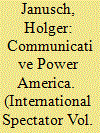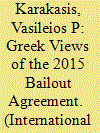|
|
|
Sort Order |
|
|
|
Items / Page
|
|
|
|
|
|
|
| Srl | Item |
| 1 |
ID:
186124


|
|
|
|
|
| Summary/Abstract |
President Trump’s credo ‘America First’ marked an end to American exceptionalism. Against this backdrop, President Biden aims to restore America’s moral leadership. Yet, he lacks a clear vision. Against the Trump doctrine and realist arguments for the end of a values-driven foreign policy, we propose a vision for a US foreign policy guided by self-restraint and critical self-reflection. We argue that following such vision is in the strategic interest of the United States. The search for a vision for a US grand strategy is not just an abstract question for International Relations scholars, but of high importance for practice. Shared visions are crucial if not necessary for successful leadership.
|
|
|
|
|
|
|
|
|
|
|
|
|
|
|
|
| 2 |
ID:
186123


|
|
|
|
|
| Summary/Abstract |
The dynamics of the Syrian war have been surrounded by discursive moves of delegitimisation and legitimisation of the parties involved – above all, the Syrian government. Here, on the one hand, Western countries such as France, the United Kingdom and the United States have discursively attempted to delegitimise the Syrian government and its position within the international community. On the other hand, Syria, Russia and China have discursively rejected these processes and discursively reaffirmed the Syrian government’s legitimacy as sovereign – understanding sovereignty as the nature of a legitimate government. These opposite positions gave rise to discursive clashes in the United Nations Security Council.
|
|
|
|
|
|
|
|
|
|
|
|
|
|
|
|
| 3 |
ID:
186128


|
|
|
|
|
| Summary/Abstract |
In July 2015, after intense negotiations with its creditors, Greece received a bailout in exchange for fiscal restraint. The coalition government at that time, led by the left-wing SYRIZA party, elected on the basis of an anti-austerity platform, eventually accepted the prevalent austerity frames of the creditors. Through the aid of Q-method, an analysis of Greek opinion leaders’ views of the negotiation highlights that this outcome can be explained in two different ways. The first posits that the ideological overtones that ruling SYRIZA injected in its negotiation strategy exhibited a lack of socialisation and undermined Greece’s already weak bargaining position. The second focuses on the institutional status quo bias in the Eurogroup in Germany’s favour, which discourages any change in the Eurozone. These two views may have partly been influenced by questions of political accountability.
|
|
|
|
|
|
|
|
|
|
|
|
|
|
|
|
| 4 |
ID:
186125


|
|
|
|
|
| Summary/Abstract |
The United States (US) cannot reach an agreement with North Korea because US domestic politics will not support the magnitude of concessions that would be required to turn Pyongyang into a denuclearised yet satisfied regional power. While domestic constraints on the US side are not the only (or even the primary) reason for the non-materialisation of a peace agreement between the US and North Korea, they are an overlooked contributing factor. If future attempts are made to mollify the North Korean regime, they will have to be instigated by US regional allies, with Washington playing a supporting role at most.
|
|
|
|
|
|
|
|
|
|
|
|
|
|
|
|
| 5 |
ID:
186129


|
|
|
|
|
| Summary/Abstract |
Energy transitions have been framed in environmental-economic terms, which shaped their scale and design. A strategic frame has emerged, however, with strategic energy security and geopolitical considerations penetrating governmental rationalities. An analysis of strategic framing allows advancing the debate on energy transitions, opening up unexplored avenues for their upscaling and unpacking critical linkages between national policy goals. In the case of Greece, although the strategic framing has started informing governmental rationality, the energy transition is still framed predominantly in environmental-economic terms. Thus, Greece continues to miss out on the opportunities the strategic framing of energy transitions presents for consolidating the country’s energy security and geopolitical stand.
|
|
|
|
|
|
|
|
|
|
|
|
|
|
|
|
| 6 |
ID:
186126


|
|
|
|
|
| Summary/Abstract |
Authoritarian regimes in the Global South diffuse compelling narratives of China, the Belt and Road Initiative (BRI) and its development success to reinforce authoritarian practices discursively. A case illustrative of this process is that of Egypt under President Abdul Fatah el-Sisi. An analysis drawing on strategic narrative theory highlights that the el-Sisi regime has been deploying a persuasive narrative on China, its development experience and the BRI to reinforce authoritarianism discursively under the pretext of preserving the state’s sovereignty and achieving progress and the public good. Such a process is called Authoritarian Reinforcement (AR).
|
|
|
|
|
|
|
|
|
|
|
|
|
|
|
|
| 7 |
ID:
186127


|
|
|
|
|
| Summary/Abstract |
Situated at the crossroads of the Silk Road, Central Asia has been an arena of international competition for centuries. Today, a “New Great Game” appears to be taking place between Russia, China and, to a lesser extent, the United States and the European Union for regional hegemony. In the last two decades, Russia and China formed an “axis of convenience”, both to counter Western influence and to thwart regional challenges; however, this has increasingly turned to rivalry in recent years, with China gradually replacing Russia as the chief power with regard to geo-economic and energy assets in some Central Asian countries. An analysis based on Power Transition Theory points to two possible future scenarios for the rivalry, namely China’s predominance or a Chinese-Russian modus vivendi based on a ‘division of labour’.
|
|
|
|
|
|
|
|
|
|
|
|
|
|
|
|
| 8 |
ID:
186121


|
|
|
|
|
| Summary/Abstract |
The cases of Poland’s 2018-2019 and South Africa’s 2019-2020 terms as elected members (E10) of the United Nations Security Council (UNSC) can be used to confront the well-known claim that due to a prevailing democratic, legitimacy or efficiency deficit(s) in the structure and/or working methods of the Council, there is no significant space for the E10 members to be influential. By examining these two representative cases, the E10’s capacity to exert such influence can indeed be detected on multiple levels, which highlights the numerous channels and practices available to the elected members to act as veritable norm entrepreneurs at this most prominent institution of global governance.
|
|
|
|
|
|
|
|
|
|
|
|
|
|
|
|
|
|
|
|
|